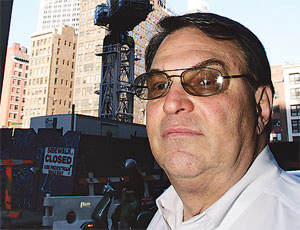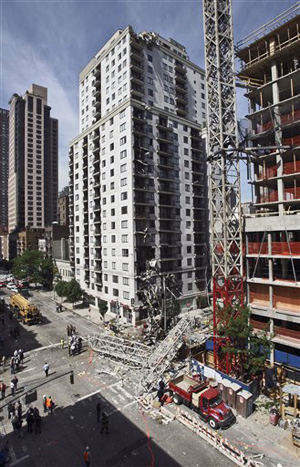

Criminal prosecution of the owner of a collapsed tower crane that killed two New York City construction workers in a 2008 accident will proceed next month, according to a Sept. 19 ruling by a state Supreme Court judge. The negligent homicide trial of James F. Lomma, the former head mechanic and two firms the owner controlled is set to start in mid-November in Manhattan.
Sources close to the case say it is likely to be a "bench" trial, with a ruling by the trial judge rather than a jury.
Judge J. Thomas Farber's 21-page ruling rejects the defendants' motion to dismiss the case or drop criminal charges. They contended the prosecutors had presented "skewed" facts to the grand jury, which ruled earlier this year that the case should proceed. Farber's opinion repeats with more detailed analysis an oral decision he rendered earlier this year in support of the grand jury's ruing.
Manhattan District Attorney Cyrus Vance Jr. unsealed charges in 2010 against Lomma, 64; his former employee, Tibor Varganyi, 63; and two of Lomma's firms: New York Crane, which owned the collapsed Kodiak-model crane, and J.F. Lomma Inc., a related trucking firm. They face charges of second-degree manslaughter, second-degree assault, criminally negligent homicide and second-degree reckless endangerment.
Not Guilty Pleas Entered
The defendants pleaded not guilty to the charges and posted bail.
Prosecutors blame Lomma, Varganyi and the firms for the deaths of union crane operator Donald C. Leo and another worker, Ramadan Kurtaj, arguing the defendants failed to correct a rotator gear on the crane that snapped, causing it to collapse and rain steel debris onto an Upper East Side neighborhood.
The trial, as set, would follow by just a few months the acquittal of three construction managers in a criminal case also pushed by the prosecutor. The trial was triggered by the deaths of two city firefighters in a 2007 fire in a Manhattan high-rise, the former Deutsche Bank, that was being cleaned for asbestos and demolished.
In his Lomma case ruling, Farber said, "It seems reasonably clear that the defendants knew that a defective weld in the slew bearing would be disastrous and would almost certainly result in death or serious physical injury to works or passersby." He added, "With respect to criminal negligence, a jury could certainly find that defendants, in order to save money and time, had a critical part manufactured by a company that they clearly should have known could not manufacture the part to acceptable standards."
Farber acknowledges the defendants' argument that "different inferences" of the facts could be drawn. However, he said, "As long as the grand jury could draw inferences of guilt, it does not matter that a trier of fact could draw inferences of innocence. These will ultimately be questions of fact for a trial jury to resolve. Whether defendants acted recklessly or with criminal negligence is a question for the trier of fact."

Post a comment to this article
Report Abusive Comment